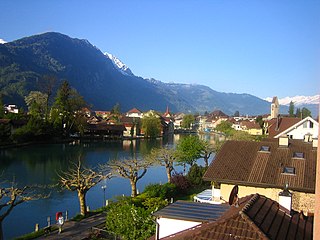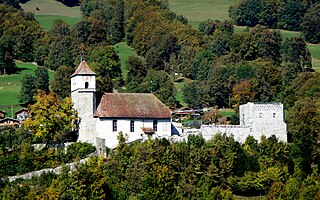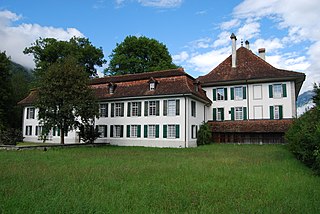
The canton of Bern or Berne is one of the 26 cantons forming the Swiss Confederation. It is composed of ten districts and its capital city is Bern. The bear is the heraldic symbol of the canton, displayed on a red-yellow background.

Interlaken is a Swiss town and municipality in the Interlaken-Oberhasli administrative district in the canton of Bern. It is an important and well-known tourist destination in the Bernese Oberland region of the Swiss Alps, and the main transport gateway to the mountains and lakes of that region.

Grindelwald is a village and municipality in the Interlaken-Oberhasli administrative district in the canton of Berne in Switzerland. In addition to the village of Grindelwald, the municipality also includes the settlements of Alpiglen, Burglauenen, Grund, Itramen, Mühlebach, Schwendi, Tschingelberg and Wargistal.

The Bernese Oberland is the higher part of the canton of Bern, Switzerland, in the southern end of the canton, and one of the canton's five administrative regions.

Ringgenberg is a village and a municipality in the Interlaken-Oberhasli administrative district in the canton of Bern in Switzerland. Besides the village of Ringgenberg, the municipality also includes the village of Goldswil.

Wilderswil is a village and a municipality in the Interlaken-Oberhasli administrative district in the canton of Bern in Switzerland.

Lütschental is a village and a municipality in the Interlaken-Oberhasli administrative district in the canton of Bern in Switzerland.

Bönigen is a village and municipality in the Interlaken-Oberhasli administrative district in the Swiss canton of Bern. It lies on the shore of Lake Brienz, near to the mouth of the river Lütschine, and adjacent to the resort town of Interlaken.

Habkern is a municipality in the Interlaken-Oberhasli administrative district in the canton of Bern in Switzerland. The municipality includes the settlements of Bohlseiten, Bort, Schwendi and Mittelbäuert.

Matten bei Interlaken is a village and municipality in the Interlaken-Oberhasli administrative district in the canton of Bern in Switzerland.

Niederried bei Interlaken is a municipality in the Interlaken-Oberhasli administrative district in the canton of Bern in Switzerland.

Oberried am Brienzersee is a municipality and village in the Interlaken-Oberhasli administrative district in the canton of Bern in Switzerland. Besides Oberried itself, the municipality includes the settlements of Dörfli and Ebligen.

Unspunnen Castle is a castle, now in ruins, located in the municipality of Wilderswil in the Bernese Highlands of Switzerland. The castle, likely constructed in the early 12th century, overlooks the city of Interlaken.

Oberhofen Castle is a castle in the municipality of Oberhofen of the Canton of Bern in Switzerland. It is a Swiss heritage site of national significance.

Ringgenberg Castle is a castle in the municipality of Ringgenberg of the Canton of Bern in Switzerland. It is a Swiss heritage site of national significance.

Wimmis Castle is a castle in the municipality of Wimmis of the Canton of Bern in Switzerland. It is a Swiss heritage site of national significance.

Interlaken Monastery was a convent of the Augustinian Canons Regular from about 1133 until 1528 at Interlaken in the canton of Bern in Switzerland. It is a Swiss heritage site of national significance.

The ruins of Grünenberg Castle, Schnabelburg Castle and Langenstein Castle are a complex of three interconnected castles on a hill above the municipality of Melchnau in the canton of Bern in Switzerland. The three castles formed the center of power of the Barons of Grünenberg in the Oberaargau region during the High Middle Ages.

Weissenburg Castle is a ruined castle in the municipality of Därstetten of the Canton of Bern in Switzerland.

Thurnen is a municipality in the Bern-Mittelland administrative district in the canton of Bern in Switzerland. On 1 January 2020 the former municipalities of Kirchenthurnen, Lohnstorf and Mühlethurnen merged to form the new municipality of Thurnen.





















